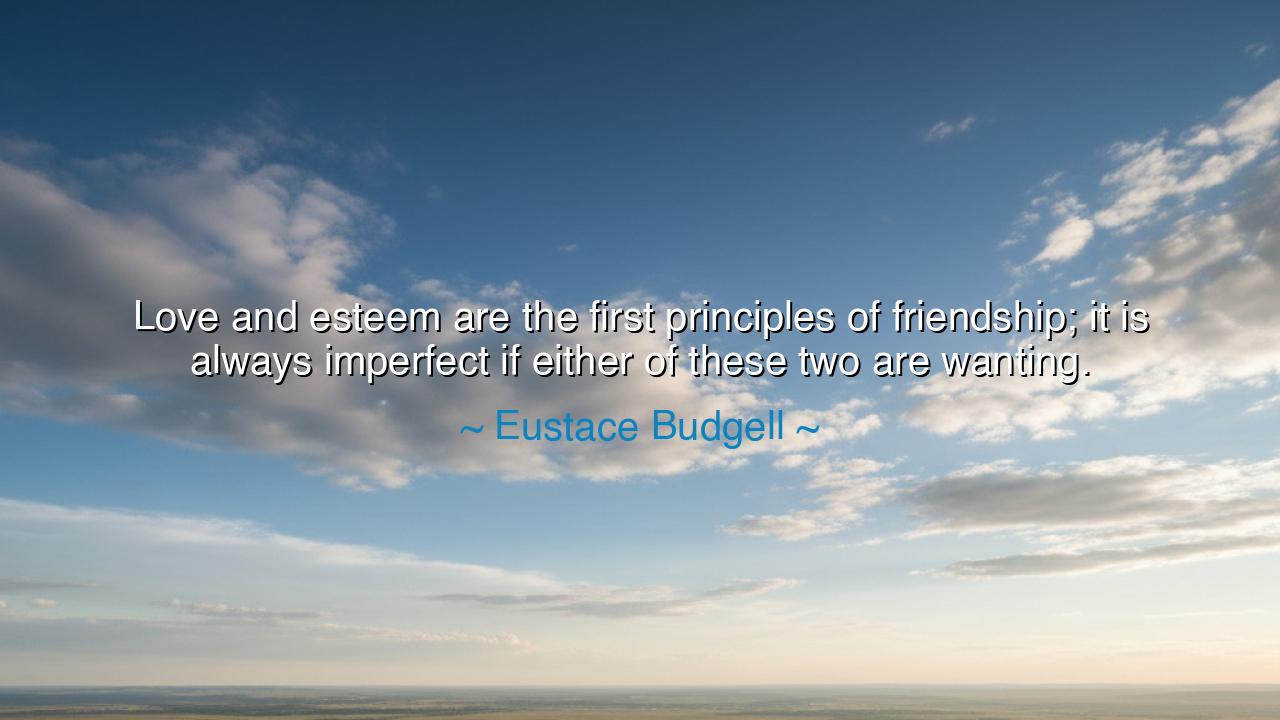
Love and esteem are the first principles of friendship; it is
Love and esteem are the first principles of friendship; it is always imperfect if either of these two are wanting.






"Love and esteem are the first principles of friendship; it is always imperfect if either of these two are wanting." These profound words from Eustace Budgell offer a timeless reflection on the essence of friendship. According to Budgell, for a friendship to be true and enduring, it must be rooted in two foundational principles: love and esteem. Love provides the emotional bond that connects friends, while esteem—the respect and admiration we hold for one another—ensures that the relationship remains grounded in mutual regard. When either of these elements is absent, the friendship becomes imperfect and ultimately weak, unable to withstand the trials of life. Thus, Budgell teaches us that friendship is not a casual or fleeting bond, but a profound connection that thrives on genuine affection and respect.
In the ancient world, the concept of friendship was seen as a moral and spiritual pursuit. Aristotle, in his work Nicomachean Ethics, identified virtue as the highest form of friendship, one that is not motivated by selfish gain but by a shared commitment to goodness. For Aristotle, true friendship requires both love—the emotional connection—and esteem, or respect for the other’s virtue and moral character. Without esteem, a friendship lacks the strength to endure the trials of life. Without love, it becomes hollow, a mere social arrangement. In this way, Aristotle’s views align with Budgell’s: the two key pillars of any lasting friendship are love and esteem.
Consider the bond between Achilles and Patroclus in Greek mythology. Their friendship was not born out of necessity or convenience but from a genuine love for one another, coupled with a deep esteem for each other's strength and character. Achilles, though a powerful warrior, was moved by Patroclus’s courage, and Patroclus admired Achilles not just for his prowess in battle, but for his virtue and honor. This mutual respect and affection were what made their friendship one of the most enduring and tragic in myth. When Patroclus was killed in battle, it was not merely the loss of a companion that devastated Achilles, but the loss of someone whose love and esteem had shaped him as a person. Their friendship was, in essence, a partnership based on both affection and respect, showing how love and esteem combine to create a friendship that is both powerful and transformative.
The relationship between David and Jonathan in the Bible provides another example of a friendship built on love and esteem. Despite the political and familial pressures they faced—Jonathan being the son of King Saul and David the future king—the bond between the two was marked by mutual respect and deep affection. Jonathan, even at great personal risk, chose to support David, knowing that his loyalty to his friend was rooted in a shared sense of honor and a love that transcended royal politics. David, in turn, respected Jonathan for his selflessness and courage. When Jonathan died in battle, David’s lamentation expressed not just sorrow for the loss of a friend, but deep admiration for Jonathan’s virtues. The love and esteem they shared formed the foundation of their friendship, making it one of the most profound relationships in the scriptures.
In more recent history, we can observe the friendship between John Adams and Thomas Jefferson—two of the founding fathers of the United States. Despite their differences in political philosophy, their friendship was grounded in respect for each other's character and a shared vision for the country. After years of political rivalry, their friendship was rekindled through an exchange of letters, where they expressed not only respect for each other’s intellect and achievements, but also a genuine affection born of their shared history. Their letters, filled with both love and esteem, illustrate how a true friendship can endure even through times of political conflict, with mutual respect acting as the anchor that holds it together.
Budgell’s wisdom speaks to a fundamental truth: friendship is not merely a bond of convenience or proximity. It is an active partnership that requires both love—a deep, emotional connection—and esteem, a recognition of each other’s virtue and strength. When either of these elements is missing, the foundation of the friendship is weakened, and it can no longer provide the support, strength, and joy that true friendship offers. Whether it’s a comrade in battle, a colleague in work, or a confidant in life, love and esteem are the twin forces that nourish and sustain the bond. Without them, the friendship becomes imperfect, unable to withstand life’s inevitable tests.
The lesson is clear: in our own relationships, we must strive to build friendships rooted in love and esteem. Love allows us to connect with others on a deep, emotional level, while esteem ensures that we honor their character and virtue. We must ask ourselves: do we offer both love and esteem to those we call friends? Do we recognize their strength and goodness while also cherishing the bond we share? Let us nurture our friendships with the same care and attention, ensuring that these two principles—love and esteem—are always present. By doing so, we will build friendships that are not only fulfilling but also resilient, capable of withstanding the trials of life and standing as testaments to the strength and goodness of the human spirit.






AAdministratorAdministrator
Welcome, honored guests. Please leave a comment, we will respond soon